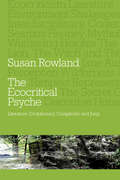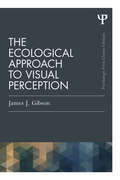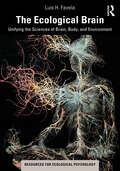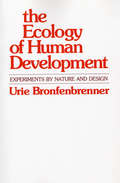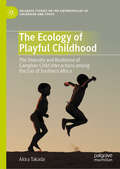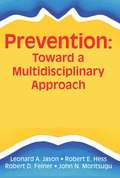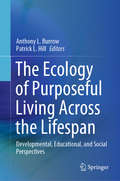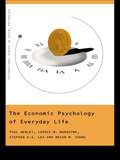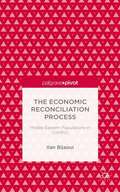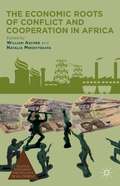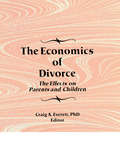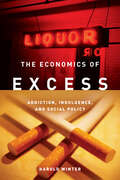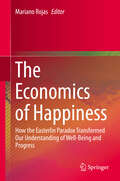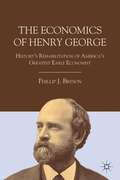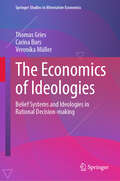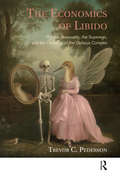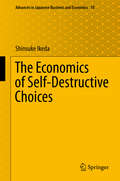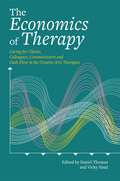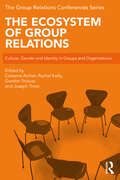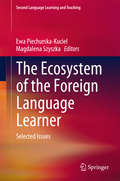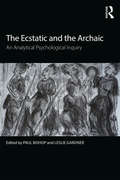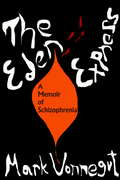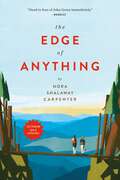- Table View
- List View
The Ecocritical Psyche: Literature, Evolutionary Complexity and Jung
by Susan RowlandThe Ecocritical Psyche unites literary studies, ecocriticism, Jungian ideas, mythology and complexity evolution theory for the first time, developing the aesthetic aspect of psychology and science as deeply as it explores evolution in Shakespeare and Jane Austen. In this book, Susan Rowland scrutinizes literature to understand how we came to treat 'nature' as separate from ourselves and encourages us to re-think what we call 'human.' By digging into symbolic, mythological and evolutionary fertility in texts such as The Secret Garden, The Tempest, Wuthering Heights and The Lion, the Witch and the Wardrobe, the book argues that literature is where the imagination, estranged from nature in modernity, is rooted in the non-human other. The Ecocritical Psyche is unique in its interdisciplinary expansion of literature, psyche, science and myth. It develops Jungian aesthetics to show how Jung's symbols correlate with natural signifying, providing analytical psychology with a natural home in ecocritical literary theory. The book is therefore essential reading for seasoned analysts and those in training as well as academics involved in literary studies and Jungian psychology.
The Ecological Approach to Visual Perception: Classic Edition (Psychology Press & Routledge Classic Editions)
by James J. GibsonThis book, first published in 1979, is about how we see: the environment around us (its surfaces, their layout, and their colors and textures); where we are in the environment; whether or not we are moving and, if we are, where we are going; what things are good for; how to do things (to thread a needle or drive an automobile); or why things look as they do. The basic assumption is that vision depends on the eye which is connected to the brain. The author suggests that natural vision depends on the eyes in the head on a body supported by the ground, the brain being only the central organ of a complete visual system. When no constraints are put on the visual system, people look around, walk up to something interesting and move around it so as to see it from all sides, and go from one vista to another. That is natural vision -- and what this book is about.
The Ecological Brain: Unifying the Sciences of Brain, Body, and Environment (Resources for Ecological Psychology Series)
by Luis H. FavelaThe Ecological Brain is the first book of its kind, using complexity science to integrate the seemingly disparate fields of ecological psychology and neuroscience. The book develops a unique framework for unifying investigations and explanations of mind that span brain, body, and environment: the NeuroEcological Nexus Theory (NExT). Beginning with an introduction to the history of the fields, the author provides an assessment of why ecological psychology and neuroscience are commonly viewed as irreconcilable methods for investigating and explaining cognition, intelligent behavior, and the systems that realize them. The book then progresses to its central aim: presenting a unified investigative and explanatory framework offering concepts, methods, and theories applicable across neural and ecological scales of investigation. By combining the core principles of ecological psychology, neural population dynamics, and synergetics under a unified complexity science approach, NExT offers a compressive investigative framework to explain and understand neural, bodily, and environmental contributions to perception-action and other forms of intelligent behavior and thought. The book progresses the conversation around the role of brains in ecological psychology, as well as bodies and environments in neuroscience. It is essential reading for all students of ecological psychology, perception, cognitive sciences, and neuroscience, as well as anyone interested in the history and philosophy of the brain/mind sciences and their state-of-the-art methods and theories.
The Ecology of Human Development: Experiments by Nature and Design
by Urie BronfenbrennerHere is a book that challenges the very basis of the way psychologists have studied child development. According to Urie Bronfenbrenner, one of the world’s foremost developmental psychologists, laboratory studies of the child’s behavior sacrifice too much in order to gain experimental control and analytic rigor. Laboratory observations, he argues, too often lead to “the science of the strange behavior of children in strange situations with strange adults for the briefest possible periods of time.” To understand the way children actually develop, Bronfenbrenner believes that it will be necessary to observe their behavior in natural settings, while they are interacting with familiar adults over prolonged periods of time. This book offers an important blueprint for constructing such a new and ecologically valid psychology of development. The blueprint includes a complete conceptual framework for analysing the layers of the environment that have a formative influence on the child. This framework is applied to a variety of settings in which children commonly develop, ranging from the pediatric ward to daycare, school, and various family configurations. The result is a rich set of hypotheses about the developmental consequences of various types of environments. Where current research bears on these hypotheses, Bronfenbrenner marshals the data to show how an ecological theory can be tested. Where no relevant data exist, he suggests new and interesting ecological experiments that might be undertaken to resolve current unknowns. Bronfenbrenner’s groundbreaking program for reform in developmental psychology is certain to be controversial. His argument flies in the face of standard psychological procedures and challenges psychology to become more relevant to the ways in which children actually develop. It is a challenge psychology can ill-afford to ignore.
The Ecology of Playful Childhood: The Diversity and Resilience of Caregiver-Child Interactions among the San of Southern Africa (Palgrave Studies on the Anthropology of Childhood and Youth)
by Akira TakadaWhile studies of San children have attained the peculiar status of having delineated the prototype for hunter-gatherer childhood, relatively few serious ethnographic studies of San children have been conducted since an initial flurry of research in the 1960s and 1970s. Based on the author’s long-term field research among several San groups of Southern Africa, this book reconsiders hunter-gatherer childhood using “play” as a key concept. Playfulness pervades the intricate practices of caregiver-child interactions among the San: immediately after birth, mothers have extremely close contact with their babies. In addition to the mother’s attentions, other people around the babies actively facilitate gymnastic behavior to soothe them. These distinctive caregiving behaviors indicate a loving, indulgent attitude towards infants. This also holds true for several language genres of the San that are used in early vocal communication. Children gradually become involved in various playful activities in groups of children of multiple ages, which is the major locus of their attachment after weaning; these playful activities show important similarities to the household and subsistence activities carried out by adults. Rejuvenating studies of San children and hunter-gatherer childhood and childrearing practices, this book aims to examine these issues in detail, ultimately providing a new perspective for the understanding of human sociality.
The Ecology of Prevention: Illustrating Mental Health Consultation
by Robert E HessThis provocative volume offers an enlightening look at mental health consultation as a preventive service. To enhance the prospects of consultation being preventive, consultation is defined as an ecological enterprise. Although attention is given to outcomes, process is the key in this book. This beneficial volume presents ten valuable principles to guide the work of a consultant, plus case studies representing different topics--self-esteem of high school students in rural Oregon, child abuse prevention in a rural and urban setting in Iowa, a junior high school consolidation in Maryland, and preventive services for Lutheran congregations in Minnesota. Each of the authors of the four case examples in their actual consultation and in their descriptions of their consultation have extended and elaborated what it means to think ecologically. Following an unusual format, the comments from the recipients of the interventions described in the case studies have been included as a reminder that prevention, in its truest spirit, involves partnerships, that “subjects” or “consultees” have feelings and opinions about their participation, and that subjective data are as important as objective data.
The Ecology of Purposeful Living Across the Lifespan: Developmental, Educational, and Social Perspectives
by Patrick L. Hill Anthony L. BurrowThis book explores what it means to live a purposeful life and outlines the benefits associated with purpose across different life domains. It also demonstrates that purpose in life is not reducible to constructs such as happiness, well-being, or identity development.The importance of having a sense of purpose in life is attracting renewed attention in both scientific and social arenas. Mounting evidence from intricately designed experiments and large-scale studies reveals how pursuing a purpose can make a person happier, healthier, and even lengthen their lifespan. However, existing texts on purpose have said little on why having has these effects, how it may influence our ability to navigate diverse environments, or how best to consider the construct from a multidisciplinary approach that moves beyond psychology.Recognizing this gap in the literature, this book provides multidisciplinary perspectives on the topic of purpose, and examines what we can do as researchers, interventionists, and society as a whole to imbue purposefulness in the lives of people across the lifespan. It includes contributions from key figures on topics such as identity, health, youth programs and youth purpose, diversity, aging and work.
The Economic Psychology of Everyday Life (International Series in Social Psychology)
by Brian Young Paul Webley Carole Burgoyne Stephen LeaFrom childhood through to adulthood, retirement and finally death, The Economic Psychology of Everyday Life uniquely explores the economic problems all individuals have to solve across the course of their lives.Webley, Burgoyne, Lea and Young begin by introducing the concept of economic behaviour and its study. They then examine the main economic issues faced at each life stage, including:* the impact of advertising on children* buying a first house and setting up home* changing family roles and gender-linked inequality* redundancy and unemployment* coping on a pension * obituaries, wills and inheritance.Finally they draw together the commonalties of economic problems across the lifespan, discuss generational and cultural changes in economic behaviour, and examine the significance of other, non-economic constraints, upon individuals.The Economic Psychology of Everyday Life provides a much-needed comprehensive and accessible guide to economic psychology which will be of great interest to researchers and students.
The Economic Reconciliation Process: Middle Eastern Populations in Conflict
by Ilan BijaouiThe Economic Reconciliation Process develops hybrid cross-border models based on the free economic zone, the industrial district, and the cluster to generate a common economic interest between countries and populations in declared or potential conflict in the Middle East.
The Economic Roots Of Conflict And Cooperation In Africa
by Natalia Mirovitskaya William AscherThis book combines overviews of the nature and causes of inter-group violence in North Africa and sub-Saharan Africa with a collection of country case studies. Both the overview chapter and the case studies trace how economic policy initiatives, and consequent changes in the roles and statuses of various groups, shape conflict or cooperation.
The Economics of Creativity
by Pierre-Michel MengerCreative work has been celebrated as the highest form of achievement since at least Aristotle. But our understanding of the dynamics and market for creative work--artistic work in particular--often relies on unexamined clichés about individual genius, industrial engineering of talent, and the fickleness of fashion. Pierre-Michel Menger approaches the subject with new rigor, drawing on sociology, economics, and philosophy to build on the central insight that, unlike the work most of us do most of the time, creative work is governed by uncertainty. Without uncertainty, neither self-realization nor creative innovation is possible. And without techniques for managing uncertainty, neither careers nor profitable ventures would surface. In the absence of clear paths to success, an oversupply of artists and artworks generates boundless differentiation and competition. How can artists, customers, entrepreneurs, and critics judge merit? Menger disputes the notion that artistic success depends solely on good connections or influential managers and patrons. Talent matters. But the disparity between superstardom and obscurity may hinge initially on minor gaps in intrinsic ability. The benefits of early promise in competition and the tendency of elite professionals to team up with one another amplify and disproportionately reward even small differences. Menger applies his temporal and causal analysis of behavior under uncertainty to the careers and oeuvres of Beethoven and Rodin. The result is a thought-provoking book that brings clarity to our understanding of a world widely seen as either irrational or so free of standards that only power and manipulation count.
The Economics of Divorce: The Effects on Parents and Children
by Craig EverettThe Economics of Divorce recognizes the critical role economic factors play during and after the divorce process. In the past, research into this issue has remained very general despite the enormous weight economics put on the entire divorce process. This book concentrates on elements specifically relevant to the economic variables of divorce. It focuses on the issues of work, employment, and financial support after divorce and how these issues affect the parents, children, and home environments of divorced families. The research presented not only provides insights into the economic aspects of divorce, but it is also invaluable to the entire study of divorce and remarriage as it explores the personal impact of these issues.Geared toward anyone working with divorced families, whether they are clinicians, educators, mediators, or attorneys, The Economics of Divorce is also of use to members of divorced or remarried families. The book contains demographics on the financial lives of custodial parents who remarry, custodial parents who work, and the financial support of college students from divorced families. It offers a close study of the realities of single parenting and reentering the work force, as well as the economic consequences of marital dissolution. The Economics of Divorce is unique in that it is the first publication of its kind to formally identify the economic results of divorcing and remarried families. It reshapes thinking on issues often taken for granted and redefines the ways in which financial issues are addressed. This book analyzes and advises readers on a number of personal and practical issues. Topics discussed include: the role of employment for women intergenerational financial support the economics of remarried families financial support for children’s college educationThe book was designed not only to address these issues but to also facilitate further research and discussion into the economic realities of divorced families. The Economics of Divorce is the first in its field to address the impact of economics on divorced families, but hopefully not the last.
The Economics of Excess: Addiction, Indulgence, and Social Policy
by Harold WinterThe Economics of Excess discusses both standard and behavioral economics as they apply to addiction, indulgence, and social policy. Chapter One provides a thorough discussion of economic models of addiction. The model developed in most detail takes into account both standard and behavioral approaches. The next three chapters examine specific indulgences: smoking, drinking, and overeating. The heart of this book is its comprehensive discussion of what is often referred to as the "new paternalism. " Many economists are now challenging the more traditional belief that, unless they are harming others, people should be left to their own indulgences. As more and more economists are arguing for policies that are designed to protect people from themselves, this book offers a serious, yet accessible, discussion of the pros and cons of such interventions. Written in an approachable style, this book will serve researchers who are new to the economics of addiction and students in a variety of economics and policy courses alike.
The Economics of Freedom
by Sebastiano Bavetta Pietro NavarraWhat is freedom? Can we measure it? Does it affect policy? This book develops an original measure of freedom called "Autonomy Freedom," consistent with J. S. Mill's view of autonomy, and applies it to issues in policy and political design. The work pursues three aims. First, it extends classical liberalism beyond exclusive reliance on negative freedom so as to take autonomous behavior explicitly into account. Second, it grounds on firm conceptual foundations a new standard in the measurement of freedom that can be fruitfully coupled with existing gauges. Third, it shows empirically that individual preferences for redistribution and cross-country differences in welfare spending in Organisation for Economic Co-operation and Development (OECD) countries are driven by the degree of "autonomy freedom" that individuals enjoy. By means of an interdisciplinary approach and a sophisticated econometric methodology, the book takes an explicit stand in defense of freedom and sets the basis for a liberalism based upon people's actions and institutions.
The Economics of Happiness: How the Easterlin Paradox Transformed Our Understanding of Well-Being and Progress
by Mariano RojasThis book presents a panoramic view of the implications from Richard Easterlin’s groundbreaking work on happiness and economics. Contributions in the book show the relevance of the Easterlin Paradox to main areas, such as the relationship between income and happiness, the relationship between economic growth and well-being, conceptions of progress and development, design and evaluation of policies for well-being, and the use of happiness research to address welfare economics issues. This book is unique in the sense that it gathers contributions from senior and top researchers in the economics of happiness, whom have played a central role in the consolidation of happiness economics, as well as promising young scholars, showing the current dynamism and consolidation of happiness economics.
The Economics of Henry George
by Phillip J. BrysonHenry George the greatest, most famous and most rejected of early American economists who trained himself in classical economics and developed a theory of a 'single tax'. There is much literature on many specific facets and aspects of George's work, but we lack a book which provides an overview of George's economics. . . until now!
The Economics of Ideologies: Belief Systems and Ideologies in Rational Decision-making (Springer Studies in Alternative Economics)
by Thomas Gries Carina Burs Veronika MüllerMany of the major international and intrastate crises and conflicts, but also the threat to democratic principles, are driven by belief systems and ideologies. They fuel political polarization, which is particularly evident in the battleground of social media. Nevertheless, we hardly pay attention to ideologies, their narratives, functions and organizations in economic theory today. Ideologies as &“non-rational beliefs&” seem incompatible with rationality in economic models. Therefore, the book examines the role of ideologies and belief systems in individual decision-making behavior from an economic and rational perspective. Due to the fact that people have incomplete information, belief systems and ideologies fulfill a number of important functions. While ideologies themselves serve psychological needs, they are used as a cognitive framework for rational decision-making once they have been adopted through a Bayesian learning process. They influence decisions in a wide range of areas, from consumption and work to politics. This is where the role of ideological organizations becomes important, because they determine the ideological direction of the narratives and their dissemination. Thus, ideologies give a normative direction, for better or for worse. The &“quality&” of ideological leadership can be evaluated normatively on the basis of principles such as individual sovereignty and human dignity. A democratic discourse requires an information and communication system that enables an evaluation of precisely these ideologies, free from resource and information power.
The Economics of Libido: Psychic Bisexuality, the Superego, and the Centrality of the Oedipus Complex
by Trevor C. PedersonThis book is an attempt to get beyond pluralism by embedding psychoanalysis in philosophy and returning to Freud qua psychologist to link the depths of the mind to its surface. Beginning with the proposition that egoism and altruism are a more accurate representation of the binary of activity and passivity, The Economics of Libido revisits Freud's work to contextualize his central concepts and expand upon them. Egoism and altruism are further divided into masculine and feminine drives which can exist in either sex due to psychic bisexuality. The author's Freud places the Oedipus complex as the height of personal happiness in striving for passionate love or success while maturing through a series of educators and mentors. The subsequent father complex is snatched from obscurity as the recreation of the parental incest taboo amongst siblings. The ideal of commitment in relationships, fairness in one's dealings with peers, and Freud's emphasis on the non-universality of guilt are given their proper weight in his model.
The Economics of Self-Destructive Choices
by Shinsuke IkedaBased on recent advances in economics, especially those in behavioral economics, this book elucidates theoretically and empirically the mechanism of time-inconsistent decision making that leads to various forms of self-destructive behavior. The topics include over-eating and obesity, over-spending, over-borrowing, under-saving, procrastination, smoking, gambling, over-drinking, and other intemperate behaviors, all of which relate to serious social problems in advanced countries. In this book, the author attempts to construct a bridge between the basic theory of time discounting, especially as of hyperbolic discounting, and empirically observed "irrational (non-classical)" behavior in the various contexts just mentioned. The empirical validity of the theory is discussed using unique micro data as well as public macro data. The book proposes prescriptions for individual decision makers, whether sophisticated or naïve, to make better choices in self-control problems, and also provides policy makers with useful advice for influencing people's decision making in the right directions. This work is recommended not only to general readers who seek to learn how to attain better self-regulation under self-control problems. It also helps researchers who seek an overview of positive and normative implications of hyperbolic discounting, and thereby reconstruct economic theory for a better understanding of actual human behavior and the resulting economic dynamics .
The Economics of Therapy: Caring for Clients, Colleagues, Commissioners and Cash-Flow in the Creative Arts Therapies
by Brynjulf Stige Stine Lindahl Jacobsen Vicky Abad Alison Ledger Daniel Thomas Elaine Matthews Venter Elena Fitzthum Kingman Chung Monika Geretsegger Petra Kern Rebecca Zarate Thomas StegemannWhen you think of arts therapy, you don't often associate the practice with profit; however, ethical economic models are essential in allowing clients the most access to arts therapy services. Art therapists don't generally have formal training in economics, which can be challenging when developing their professional services. This book offers the fundamentals of micro and macro economics that apply to creating a sustainable and ethical business model that supports the development of the arts therapies profession worldwide. Through economic theory and international case studies, the authors consider the business side of therapeutic arts service with recommendations for developing an ethical and sustainable practice. With key insights and informative examples, this book will serve as a guide for small business owners looking to develop their arts therapy practice.
The Ecosystem of Group Relations: Culture, Gender and Identity in Groups and Organizations (The Group Relations Conferences Series)
by Rachel Kelly Gordon Strauss Joseph Triest Coreene ArcherThe unconscious dynamics that surface in groups when authority is exercised are of paramount importance in Group Relations Conferences; this volume addresses these considerations through research findings and speculation on the future of Group Relations both within conferences and outside of them. This is the sixth instalment in a series of books based on Tavistock Group Relations Conferences and contains a collection of papers presented at the sixth Belgirate conference. Combining chapters on theory and practice, this volume delivers a meditation on the relationships between the physical spaces we inhabit or co-create, the psychic, inner or spiritual space and the liminal space in-between. Group Relations provides a window of understanding into why inequity and intergroup hostilities pervade the modern world alongside a method that illuminates how people consciously and unconsciously contribute to these tensions, whether personally, in groups or in organisations. This will be an invaluable resource for practitioners, academics, and scholars of Group Relations, as well as managers and organisational members wanting to learn more about how Group Relations methods can contribute to their organisational success.
The Ecosystem of the Foreign Language Learner
by Ewa Piechurska-Kuciel Magdalena SzyszkaThis volume examines selected aspects of the foreign language learning process from an ecological perspective, adopting a holistic view on complex interrelations among and within organisms (L2 language learners) and their milieus (family, school and society). First of all, the personal ecosystem of the learner is taken into consideration, whereby two powerful influences are intertwined: cognitive and affective aspects. The learning space formed by the individual is largely shaped by their affective states coexisting in conjunction with their cognitive processes. Moreover, this specific space is also modified by a wider array of other personal ecosystems or those of cultures. Hence, the ecosystem of the foreign language learner is also subject to influences coming from sociocultural leverage that can be represented by people they know, like parents and language teachers, who can both directly and indirectly manipulate their ecosystem. At the same time other important forces, such as culture as a ubiquitous element in the foreign language learning process, also have the power to shape that ecosystem. Accordingly, the book is divided into three parts covering a range of topics related to these basic dimensions of foreign language acquisition (the cognitive, affective and socio-cultural). Part I, Affective Interconnections, focuses on the body of original empirical research into the affective domain of not only L2 language learners but also non-native language teachers. Part II, Cognitive Interconnections, reports on contributions on language learners' linguistic processing and cognitive representations of concepts. The closing part, Socio-cultural Interconnections, provides new insights into language learning processes as they are affected by social and cultural factors.
The Ecstatic and the Archaic: An Analytical Psychological Inquiry
by Leslie Gardner Paul BishopThe word ‘archaic’ derives from the Greek arkhaios, which in turn is related to the word archē, meaning ‘principle’, ‘origin’, or ‘cause’; the notion of ecstasy, or ekstasis, implies standing outside or beyond oneself, a self-transcendence. How these two concepts are articulated and co-implicated constitutes the core question underlying this edited collection, which examines both the present day and antiquity in order to trace the insistent presence of the ecstatic amid the archaic. Presented in three parts, the contributors to this diverse book take the concept of the archaic in an entirely new direction. Part I, 'Ecstasy and the psychological', covers topics including Jung, Freud, ancient psychotherapy, desire, and theatre. Part II, 'Ecstatic-archaic history', considers Ludwig Klages, Orestes and Dionysus. Finally, Part III, 'Ancient ecstatic in other worlds', examines Luo Guanzhong’s Three Kingdoms and Enki at Eridu. The collection offers a distinctive contextualisation of the dimension of the archaic in relation to the ecstatic experience. The Ecstatic and the Archaic will appeal to readers interested in the relationship between ancient and postmodern worlds, and in how the past manifests itself in the present. It will be of great interest to academics and students of Jungian and post-Jungian ideas, classical religions and the history of ideas, as well as practitioners of analytical psychology and psychoanalysis.
The Eden Express
by Mark Vonnegut Kurt VonnegutThe Eden Express describes from the inside Mark Vonnegut's experience in the late '60s and early '70s--a recent college grad; in love; living communally on a farm, with a famous and doting father, cherished dog, and prized jalopy--and then the nervous breakdowns in all their slow-motion intimacy, the taste of mortality and opportunity for humor they provided, and the grim despair they afforded as well. That he emerged to write this funny and true book and then moved on to find the meaningful life that for a while had seemed beyond reach is what ultimately happens in The Eden Express. But the real story here is that throughout his harrowing experience his sense of humor let him see the humanity of what he was going through, and his gift of language let him describe it in such a moving way that others could begin to imagine both its utter ordinariness as well as the madness we all share.
The Edge of Anything
by Nora Shalaway CarpenterStarred Kirkus Review!A vibrant #ownvoices debut YA novel about grief, mental health, and the transformative power of friendship.Len is a loner teen photographer haunted by a past that's stagnated her work and left her terrified she's losing her mind. Sage is a high school volleyball star desperate to find a way around her sudden medical disqualification. Both girls need college scholarships. After a chance encounter, the two develop an unlikely friendship that enables them to begin facing their inner demons.But both Len and Sage are keeping secrets that, left hidden, could cost them everything, maybe even their lives.Set in the North Carolina mountains, this dynamic #ownvoices novel explores grief, mental health, and the transformative power of friendship.
